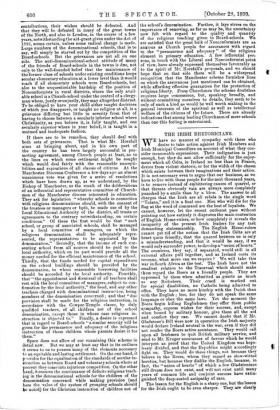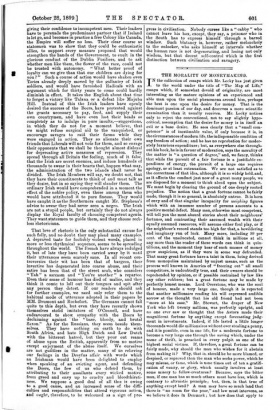THE IRISH RHETORICIANS.
WE have no manner of sympathy with those who desire to take action against Irish Members and Irish Municipal Councillors on account of what they con- sider treasonable expressions. Their indignation is just enough, but they do not allow sufficiently for the enjoy- ment which all Celts, in Ireland no less than in France, derive from violent rhetoric, or for the width of the chasm which exists between their imaginations and their action. It is not necessary even to argue that our business, as we have to live with these people for the next thousand years, is to remove instead of embittering causes of quarrel, or that threats obviously vain are always more completely punished by a smile than by a blow. The answer to all charges that the Irish are all rebels is the single word "Talana," and it is a final one. Men who will die for the flag at the word of command are the best of loyalists. We cannot, however, let the recent outburst pass without pointing out how entirely it disproves the main contention of English Home-rulers, or how completely it reveals the incapacity of the present Irish leaders for any task demanding statesmanship. The English Home-rulers cannot get rid of the notion that the Irish Celts are at heart quite friendly, that the quarrel between us is only a misunderstanding, and that it would be easy, if we would only surrender power, to develop a" union of hearts." The countries, they say, if separated, would still in all external affairs pull together, and as Ireland costs its revenue, what more can we require ? We will take this war in South Africa as the test. The Irish have not the smallest relation to the Transvaal which should make them regard the Boers as a friendly people. They are oppressed by them when admitted as guests as much as any Britishers. Their creed is marked out for special disabilities, no Catholic being admitted to office. They have no more kinship with the Dutch than with the English ; less, for they do not speak the same language or obey the same laws. Yet the moment the Boers begin killing Englishmen they offer them public sympathy, express wishes for their success, and, except when bound by military honour, give them all the aid and comfort they can. We cannot doubt that if Mr. Gladstone's Bill were now in operation the Irish majority would declare Ireland neutral in the war, even if they did not render the Boers active assistance. They would call upon all Irishmen to quit British military service, and send to Mr. Kruger assurances of favour which he would interpret as proof that the United Kingdom was hope- lessly divided, and that the Republics might accordingly fight on. They would do these things, not because they believe in the Boers, whom they regard as slow-witted heretics, but because they dislike the English, because, in fact, the "union of hearts" of which a few Gladstonians still dream does not exist, and will not exist until many years of common life and conjoint success have extin- guished the deep-seated antipathy of race.
The lesson for the English is a sharp one, but the lesson for the Irish ought to be even sharper. They are clearly giving their confidence to incompetent men. Their leaders have to persuade the predominant partner that if Ireland is let go, and becomes in practice a free Colony like Canada, the Empire will suffer no loss. Their clear course as statesmen was to show that they could be enthusiastic allies, to support every measure proposed that would strengthen the hands of the Government. to exult in the glorious conduct of the Dublin Fusiliers, and to ask whether men like them, the flower of the race, could not be trusted with autonomy. "What better proof of loyalty can we give than that our children are dying for you ?" Such a, course of action would have shaken even Tories already deeply moved by the gallantry of Irish soldiers, and would have furnished Radicals with an argument which for thirty years to come could hardly diminish in effect. It takes the English about that time to forget a victory like Talana or a defeat like Majuba Hill. Instead of this the Irish leaders have openly desired the success of the Boers, have protested against the grants necessary to pay, feed, and supply their own countrymen, and have even lost their heads so completely as to indulge in pure insults,—suggestions, in, which they do not for a moment believe, that we might refuse surgical aid to the vanquished, or encourage savages to raid their farms while they were engaged in action. They so alienate their own friends that Liberals will not vote for them, and so enrage their opponents that we shall be thought almost disloyal for deprecating active measures of repression. They spread through all Britain the feeling, much of it false. that the Irish are secret enemies, and induce hundreds of thousands to swear in their hearts that, happen what may, the administration of the two islands shall never be divided. The Irish Members will say, we doubt not, that they have their constituents to think of and must talk as they desire, but in so saying they will slander them. The ordinary Irish would have comprehended in a moment the effect of the nobler policy, even those among them who would have attributed it to pure finesse. They would have caught it as the Southerners caught Mr. Stephens's advice to swear they had never seen a negro. The Irish are not a stupid people, but certainly they do not always display the Royal faculty of choosing competent agents. They want statesmen to guide them, and they choose reck- less rhetoricians.
That love of rhetoric is the only substantial excuse for such folly, and no doubt they may plead many examples. A depraved taste for foolishly violent words, placed in more or less rhythmical sequence, seems to be spreading throughout the world. The French have always indulged it, but of late they have been carried away by it until their utterances seem scarcely sane. In all recent con- troversies their wit has been that of bargees, their invective has degenerated into coarse abuse, and their satire has been that of the street arab, who considers " Yah" a sarcasm and "You're another" a repartee. Even their sense of humour has died of malice, and they think it comic to loll out their tongues and spit after any person they detest. If our readers should ask for further examples, we need only refer them to the habitual mode of utterance adopted in their papers by MM. Drumont and Rochefort. The Germans cannot fall quite to this depth, but even they have recently shown themselves stolid imitators of O'Connell, and have endeavoured to show sympathy with the Boers by declaiming against ' the "base, bloody, and brutal Saxon." As for the Russians, they seem beside them- selves. They have nothing on earth to do with South Africa, and hate High Dutch and Low Dutch with the bitterest hatred, but they pour out reams of abuse upon the British, apparently from no motive except enjoyment of the abuse itself. We ourselves are not guiltless in the matter, many of us relieving our feelings in the Dreyfus affair with words which an Irishman would have been delighted to employ when speaking of an evicting agent, and defending the Boers, the few of us who defend them, by attributing to their assailants every wicked motive, from greed and envy up to cruelty and bloodthirsti- ness. We suppose a good deal of all this is owing to a good cause, and an increased sense of the diffi- culties and responsibilities that attend vigorous action, and ought, therefore, to be welcomed as a sign of pro- gress in civilisation. Nobody curses like a " cabby " who cannot leave his box, except, they say, a prisoner who in the South has to express himself through a barred window. Such blatancy is, however, rather melancholy to the onlooker, who asks himself at intervals whether the human race is not degenerating, and losing not only wisdom, but that decent self-control Which is the first distinction between civilisation and savagery.







































 Previous page
Previous page